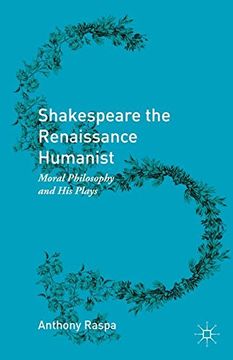Compartir
Shakespeare the Renaissance Humanist: Moral Philosophy and his Plays (en Inglés)
Anthony Raspa (Autor)
·
Palgrave Macmillan
· Tapa Dura
Shakespeare the Renaissance Humanist: Moral Philosophy and his Plays (en Inglés) - Anthony Raspa
145,82 €
153,49 €
Ahorras: 7,67 €
Elige la lista en la que quieres agregar tu producto o crea una nueva lista
✓ Producto agregado correctamente a la lista de deseos.
Ir a Mis Listas
Origen: Estados Unidos
(Costos de importación incluídos en el precio)
Se enviará desde nuestra bodega entre el
Lunes 15 de Julio y el
Lunes 29 de Julio.
Lo recibirás en cualquier lugar de España entre 1 y 5 días hábiles luego del envío.
Reseña del libro "Shakespeare the Renaissance Humanist: Moral Philosophy and his Plays (en Inglés)"
Shakespeare the Renaissance Humanist is a study of the moral philosophy that underlay the 'street' humanism in the mind of Shakespeare's spectator when he went to see Hamlet or King Lear at the Globe. The work examines the currents of thought at the basis of this humanism to show how it functioned as a sort of everyday philosophy in the spectator's life and in the lives of Shakespeare's characters. Ideas inherited from the Ancient pagans and the medieval period were commingled daily as a matter of fact. The faculty of the reason in each person was a source of spiritual experience and speculation that were lived easily at one and the same time. As we see in the person of Hamlet, there was no contradiction between spiritual thought and speculation about the outside world. Pagan attitudes to immortality in the metaphysics of this humanism conjoined without conflict with Christian beliefs about the ultimate ends of life, and these attitudes and beliefs are found argued out in Titus Andronicus. The ideal of wisdom based on the tenets of this metaphysics was much spoken about in moral philosophy. In Shakespeare's day the ideal was referred to repeatedly in terms of the dictum "Know Thyself" that was carved over the entrance to the temple of Apollo in Ancient times, and the actions of Lear and his courtier Gloucester are spoken of from the beginning of their tragedy to its end in terms of their apprenticeship in wisdom. Through the humanism that lay behind it, moral philosophy found its expression freely in all aspects of Shakespeare's theatre.
- 0% (0)
- 0% (0)
- 0% (0)
- 0% (0)
- 0% (0)
Todos los libros de nuestro catálogo son Originales.
El libro está escrito en Inglés.
La encuadernación de esta edición es Tapa Dura.
✓ Producto agregado correctamente al carro, Ir a Pagar.

